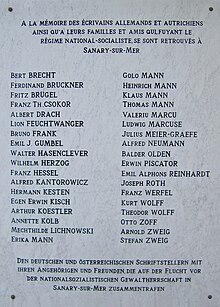Valeriu Marcu
Valeriu Marcu (born March 8, 1899 in Bucharest , † July 4, 1942 in New York City ) was a stateless writer and historian. He wrote most of his works in German.
Life
Marcu came from a Jewish family in Bukovina . When he was only 16 or 17 he visited Lenin in Zurich and offered him his work; he was a staunch communist at the time . Marcu had lived in Berlin since 1920, and his application for naturalization, which he had repeatedly made since 1929, was rejected by the Prussian authorities .
In 1926 he broke away from communism and turned to the Conservative Revolution . Ernst Jünger was enthusiastic about the biography of Marcus Scharnhorst and came into contact with him through Arnolt Bronnen . Marcu wrote for magazines that were banned by the National Socialists after 1933 , in the Weltbühne , in the Tages-Buch and in the literary world . He contributed to Klaus Mann's The Collection .
Marcu fled from the National Socialists to Switzerland and France. In 1941 he came to the USA with the help of the Emergency Rescue Committee ( Varian Fry ).
In a letter to Gottfried Treviranus , Marcu wrote on November 18, 1938:
“I was never interested in the Jewish question because I wasn't interested in it. I was always of the opinion, as a poet [Heinrich Heine] once wrote, that Judaism is not a religion but a misfortune. For me, the consistent religious continuation of Judaism is Catholicism. "
Marcu was married to Eva Dorothea Gerson (1908-2004). The daughter Tu Miki (* 1934 in Nice) lives in Manhattan .
reception
In his autobiography The Few and the Many. Roman einer Zeit (1959, 1991) Hans Sahl probably meant Valeriu Marcu by “Ignazio Morton” .
"As usual with métèques , Marcu was a fanatic of assimilation, who saw his ideal in traditional Prussianism and viewed Jewish ancestry as an undeserved fate."
Works (selection)

- Imperialism and Peace, Predatory War and Revolution . Under the pseudonym Gracchus, Neuer Deutscher Verlag FL Halle & Co., Berlin 1924
- The white and red armies . Verlag der Jugend-Internationale (St. Petersburg) 1921
- Imperialism and Peace . Berlin 1924
- Shadow of History: 15 European Profiles . Hoffmann and Campe, Berlin 1926
- Wilhelm Liebknecht 1823-26: March 1926. A picture of the German labor movement . Berlin 1926
- The rebel and democracy: on the crisis d. Socialism . E. LAub'sche Verlagsbuchhandlung, Berlin 1927
- Lenin, 30 years of Russia: With numerous, partly unpublished Images . Paul List, Leipzig 1927. After the war
- The great command of Scharnhorst. The birth of a military power in Europe . Paul List, Leipzig 1928
- The Birth of Nations: From Unity of Faith to Democracy of Money . Berlin 1930
- Men and powers of the present . Gustaf Kiepenheuer, Berlin 1930
- The expulsion of the Jews from Spain . Querido Verlag, Amsterdam 1934 ,. Reprinted after the war Matthes & Seitz, Munich 1991, ISBN 3-88221-795-2
- Machiavelli: the school of power . Allert de Lange, Amsterdam 1937. Translations in various languages. After the war Matthes & Seitz, Munich 1994 ISBN 3-88221-795-2 , + S. Fischer paperback 1999
- A head is more than four hundred larynxes . Collected essays : In the 60th year of Valeriu Marcu's death in memory. Edited by A. Corbea-Hoișie
literature
- Andrei Corbea-Hoișie : Afterword. In: Valeriu Marcu, The expulsion of Jews from Spain , Munich 1991, pp. 219–285
- Marcu, Valeriu. In: Lexicon of German-Jewish Authors . Volume 16: Lewi – Mehr. Edited by the Bibliographia Judaica archive. Saur, Munich 2008, ISBN 978-3-598-22696-0 , pp. 280–285.
Web links
- Literature by and about Valeriu Marcu in the catalog of the German National Library
- Works by and about Valeriu Marcu in the German Digital Library
- Andrei Corbea-Hoisie: Valeriu Marcu: A Romanian in literary Berlin Germanica 2006, pp. 25–46
Individual evidence
- ↑ Ernst Jünger: Complete Works, Volume 3. Diaries III: Radiation II Klett-Cotta Verlag, Stuttgart, pp. 458-460.
- ^ Afterword, p. 282 f.
- ^ Afterword , p. 283
| personal data | |
|---|---|
| SURNAME | Marcu, Valeriu |
| ALTERNATIVE NAMES | Marcus, Valeriu |
| BRIEF DESCRIPTION | Romanian writer and historian |
| DATE OF BIRTH | March 8, 1899 |
| PLACE OF BIRTH | Bucharest |
| DATE OF DEATH | 4th July 1942 |
| Place of death | New York City |